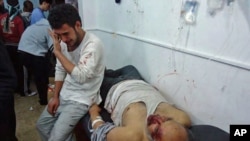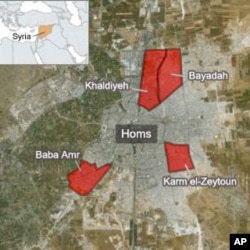Syrian rights activists say government forces have bombarded the rebellious central city of Homs for a sixth day, killing at least 60 people and leaving makeshift hospitals overwhelmed as divided world powers struggled to end the violence.
The activists said Thursday relentless government shelling and rocket strikes on Homs were creating a worsening humanitarian crisis, with rebel-dominated neighborhoods lacking water and electricity and running low on basic supplies. They said the onslaught that began early Saturday has killed hundreds of people, making it the deadliest attack on Homs of the 11-month uprising against President Bashar al-Assad's autocratic rule.
U.S.-based rights group Human Rights Watch said those responsible for "horrific attacks" on residential neighborhoods "will have to answer for them."
VOA spoke with a Syrian activist in Homs who goes by the alias Abo Emad to conceal his identity. He said Syrian security forces are not letting up on their assault, adding that even walking one block from the building where he is hiding can be deadly.
“Everyday is worse than the day before," he said of the government assault. "More deaths, more casualties, more injured people, more destroying buildings every day.”
Abo Emad said there is very little access to mobile phones or land lines. He added that hospitals are overflowing with injured people and there are not enough doctors or medical supplies to care for the wounded.
Rami Abdel Rahman of the Syrian Observatory for Human Rights in London told Alhurra TV that sporadic shelling is affecting parts of Homs, including Khaldiyeh and Bayadah, but that the heaviest onslaught is on the Baba Amr district, where conditions are extremely difficult.
Government forces are focusing on Baba Amr as it has been a center of the opposition.
In an opposition video, Muhammad al Muhammad, a doctor who is treating the wounded in Baba Amr, urged Syrians and the world community to protest the shelling attacks. He pointed to five children who appear to be wounded and called on Syrians to take to the streets to protest.
VOA cannot independently confirm the authenticity of the video's contents.
U.S. President Barack Obama called for an end to "outrageous bloodshed" in Syria in his latest condemnation of Mr. Assad's crackdown on the revolt. He was speaking Thursday after talks with visiting Italian Prime Minister Mario Monti.
Mr. Obama has agreed to work with Washington's European and Arab allies to organize a group of nations known as Friends of Syria to explore ways of further isolating and pressuring the Assad government to stop the violence. Western and Arab nations decided to try to form the group after seeing Russia and China block their efforts to pressure Mr. Assad through the U.N. Security Council.
Moscow and Beijing vetoed a Western and Arab-backed Syria resolution on Saturday, the second time they have done so since October. Both powers said they do not want the Council to take sides in a domestic conflict and create a possible pretext for foreign intervention in Syria.
Video footage from Homs
Arab League foreign ministers were preparing to meet in Cairo on Sunday to discuss their next moves in the crisis. Officials said the ministers will discuss whether to recognize the opposition Syrian National Council as the legitimate representative of Syria and whether to send a joint Arab League-United Nations observer mission to the country.
In other developments Thursday, Libya said it ordered Syria's top envoy and embassy staff to leave the country within 72 hours. Germany also said it is expelling four diplomats from the Syrian Embassy in Berlin after authorities arrested two men suspected of spying on Syrian opposition groups.
Rebel Colonel Riyadh al-Asaad, who heads the loosely-knit Free Syrian Army that is fighting government forces, called the Syrian regime a tyranny and asked for help to defeat it.
Hilal Khashan, who teaches political science at the American University of Beirut, says the Syrian government is trying to retake Homs in hopes of crushing the popular revolt at a key hub.
"They have been bombarding the city for the past six days," he said. "The bombarding is so heavy that it is clear that it is setting the stage for a ground offensive. The regime has made up its mind on conquering Homs, because they feel that if they conquer Homs, much of the uprising in the country will abate.”
Wire services and VOA reporter JulieAnn McKellogg contributed to this report.
| Join the conversation on our social journalism site - Middle East Voices. Follow our Middle East reports on Twitter and discuss them on our Facebook page. |





